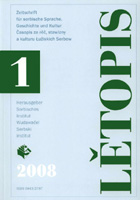Zrodźenje serbskeje romantiki. Nowe pohlady na žórła a inspiracije
The Beginning of Sorbian Romanticism. A New Perspective on Sources and Inspirations
Author(s): Franc ŠěnSubject(s): Cultural Essay, Political Essay, Societal Essay
Published by: Domowina-Verlag GmbH / Ludowe nakładnistwo Domowina
Keywords: sorbian; romanticism; sources; inspirations;zejler; literature
Summary/Abstract: The poet Handrij Zejler (1804–1872) had already produced a mature body of literary work when he was a student in Leipzig, which was to become a milestone in literary history and turned its author into the founder of a Sorbian national literature. The author investigates the question of how Zejler gained access to the poetry of Romanticism and how he discovered folk poetry for himself. In the academic literature up to now the predominant view has been that he already began to record songs as a schoolboy, encouraged by his patron Handrij Lubjenski, and in 1826 collected folk songs in Lower Lusatia together with the Pole Andrzej Kucharski. In reality Lubjenski’s view of folk poetry was similar to that of Josef Dobrovský. Zejler’s interest in folk poetry began with the discovery of a 50-year-old Lower Sorbian manuscript of the folk song collection of Count von Bünau, which was in Lubjenski’s possession. Zejler linked his early work at first to the poetic tradition he had discovered. In the early summer of 1827, inspired by his contacts with A. Kucharski, F. Palacký, F. L. Čelakovský and S. Milutinović, Zejler developed his romantic style by playing poetically with models produced by his fellow students in Leipzig and by free translations of folk songs into Upper Sorbian. In the process he produced texts which have become some of the most well known in Sorbian literature: the “Nationale Ode” (National Ode), “Rjana Lužica” (Beautiful Lusatia) and the love song “Lubka lilija” (Darling Lily).
- Issue Year: 2008
- Issue No: 1
- Page Range: 62-75
- Page Count: 14
- Language: Sorbian languages
- Content File-PDF

